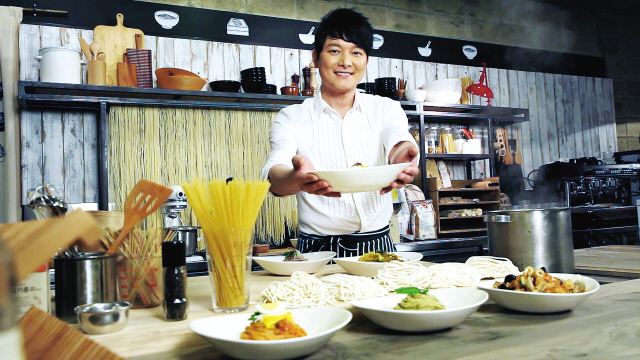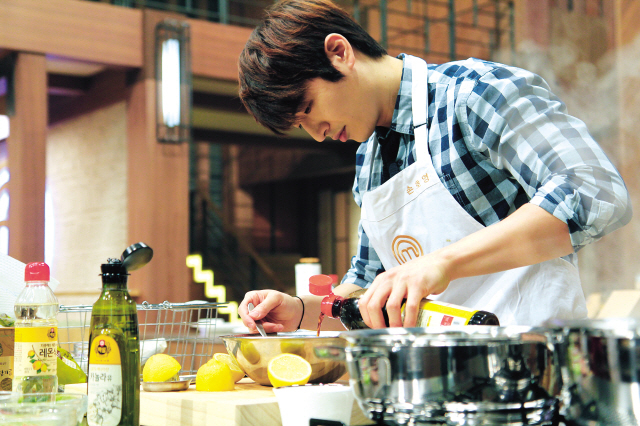‘Meokbang’ dissected
A new era of eating on television and the rise of the man who cooks
By Korea HeraldPublished : April 26, 2013 - 20:55
The recent popularity of the slang term “meokbang” may signal a new era of eating on television.
“Meok,” which is a shortened version of the verb “meokda” ― meaning “to eat” ― and “bang” ― short for “bangsong,” which translates to “on air” ― forms the self-explanatory catchall phrase for dining on-screen.
“Meokbang” can be used to describe anything from the way a movie star eats in a film to how a food program MC dines. The basic idea is that these celebrities are so talented at chowing down that it prompts viewers to want to dig in, too.
“Meok,” which is a shortened version of the verb “meokda” ― meaning “to eat” ― and “bang” ― short for “bangsong,” which translates to “on air” ― forms the self-explanatory catchall phrase for dining on-screen.
“Meokbang” can be used to describe anything from the way a movie star eats in a film to how a food program MC dines. The basic idea is that these celebrities are so talented at chowing down that it prompts viewers to want to dig in, too.

Take MBC’s “Where Are We Going, Dad” star Yoon Hoo for instance. The son of costar Yoon Min-soo catapulted to “meokbang” fame when he started scarfing down food in the popular reality variety segment featuring dads and their sons.
Now, type in his name with “meokbang” on the Internet and a bunch of blog, photo and video nods pop up ― clearly this is a hot term.
So, why are people into “meokbang”?
“Eating on-screen is popular because a wide range of viewers can relate to the concept and because it is soothing to watch,” said food cable channel Olive team head Seo Won-yea, 36, in a phone interview with The Korea Herald.
Also noteworthy is that not only are viewers zoning in on how people eat on television, there are more and more shows that focus on food in general.
As Seo pointed out, KBS’ “Happy Together” recently revamped its set-up by adding a nighttime snack cooking competition to the show. Furthermore, cable food channel Olive first launched in 2011, a mere two years ago.
According to Seo, “Watching people make food, seeing delicious food on-screen, heals, is a pleasure to watch and has a positive effect on viewers.”
With the launch of Olive came food programs featuring male chefs and male celebrities. This year, actor Seo Tai-hwa began hosting his own eponymous cooking show, where he invites guests and chats while he prepares noodle-based dishes for them.
Of “Seo Tai-hwa’s Noodle Shop,” Olive’s Seo said it is “a well-received program because it highlights the relationships fostered by cooking.”
“The program attracts male viewers in their 40s,” Seo said.

This Wednesday, a new food show featuring “Master Chef Korea Celebrity” winner Son Ho-young started airing on Olive. “We also have a program featuring a male chef and a male celebrity slated to start airing in the end of May or early June,” added Seo.
“Now society accepts and admires a man who can cook.”
It seems this change in perception is seeping into various aspects of television, including ads, according to Seo.
“These days a lot of food brand models are male celebrities like Ko Soo and Kim Soo-hyun,” said Seo.
Indeed, male celebrities are popping up in television ads for everything from rice cookers to gochujang (red chili pepper paste) to bread.
Seo believes that these sorts of advertisements help foster the fantasy of “a man who cooks for his family or his girlfriend.”
In short, the rise of the man who can cook on television seems to be partly fueled by the current trend towards eating on-screen, by society’s positive attitude towards it and by its appeal to viewers.
(oh_jean@heraldcorp.com)
-
Articles by Korea Herald







![[KH Explains] Hyundai's full hybrid edge to pay off amid slow transition to pure EVs](http://res.heraldm.com/phpwas/restmb_idxmake.php?idx=644&simg=/content/image/2024/04/18/20240418050645_0.jpg&u=20240419100350)







![[From the Scene] Monks, Buddhists hail return of remains of Buddhas](http://res.heraldm.com/phpwas/restmb_idxmake.php?idx=652&simg=/content/image/2024/04/19/20240419050617_0.jpg&u=20240419175937)

![[KH Explains] Hyundai's full hybrid edge to pay off amid slow transition to pure EVs](http://res.heraldm.com/phpwas/restmb_idxmake.php?idx=652&simg=/content/image/2024/04/18/20240418050645_0.jpg&u=20240419100350)

![[Today’s K-pop] Illit drops debut single remix](http://res.heraldm.com/phpwas/restmb_idxmake.php?idx=642&simg=/content/image/2024/04/19/20240419050612_0.jpg&u=)